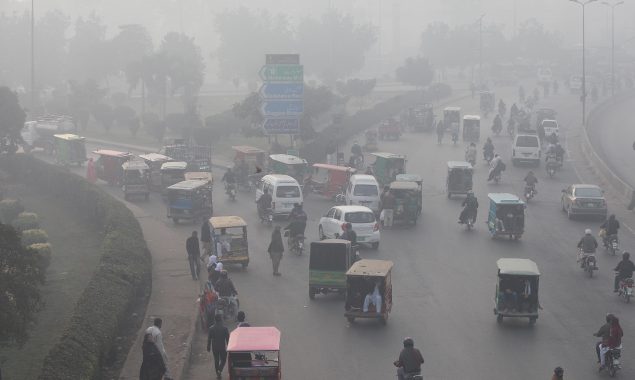
Commuters make their way along a road amid smoggy conditions in Lahore. Photo: Mohsin Raza/Bol News
LAHORE: Clean air is considered to be a basic requirement for human health. However, air pollution continues to pose a serious threat to the health and environment globally.
Air pollution is a major public health concern across Pakistan, where an estimated 128,000 people die annually from air pollution-related illnesses, according to the Global Alliance on Health and Pollution.
Lahore city’s Air Quality Index (AQI) in particular has gone down over the past decade, a period during which a large percentage of the city’s trees were logged in order to make way for road networks, residential zones and industries.
Moreover, the vehicles in the city still run mainly on a type of sulphur-laden fuel — a pollutant that pollutes around 40pc of the air in Lahore and the adjoining cities, according to a report by the UN’s Food and Agriculture Organization.
Read more: Deadly smog continues to engulf Lahore
For decades, governments across the world have treated air pollution as an environmental issue. However, it has recently started to gain attention as a major human rights issue as well.
Air pollution clearly violates the rights of all and sundry to live in a safe, clean, healthy and sustainable environment.
The citizens of Lahore are inhaling polluted air on a daily basis that is adversely affecting their health, triggering serious environmental and human rights crises.
The city of Lahore, one of the wealthiest cities in the country and once known as the “city of gardens,” has been struggling with the problems of air pollution for quite some time now, and consequently is now considered as one of the world’s most polluted cities.
The alarming situation of air contamination has forced many citizens to stay at home and take to the social media activities such as tweeting. A tweet that had been trending lately says “Lahore you’re killing me” and “how is anyone in Lahore breathing?”.
Read more: Smog continues to choke Lahore
Each year during the “smog season” — from October to January — the AQI reaches and continues to stay at hazardous levels.
Exposed workers
During this period, low-income workers such as labourers and other marginalized groups become the most vulnerable as the nature of their jobs forces them to stay exposed to the perils of polluted air throughout their working hours, particularly the ones working in the industrial areas and open fields. It is also a fact that healthcare is not easily affordable for all, further complicating the issue.
According to the workers, the government is simply ignoring the rights of people working and living in the outskirts of Lahore and even within the city by failing to reduce the level of pollution in the air.
Read more: LHC advises Punjab govt to impose lockdown in Lahore to control smog
Smog is not only posing a serious threat to health, it is adding to the traffic problems of the city as transport plying on the roads of Lahore inevitably slows down due to low visibility even on the busiest roads of the city.
The problem leads to road accidents resulting in injuries and loss of lives, and foreseeing the possible chaotic scenario, the authorities issue travel advisory. Because of such circumstances, the general public has demanded community organizations to advocate for clean air after government’s failure to address the life-threatening issue.
A human rights issue
The incorporation of human rights perspective in the recent core issue of climate change has further highlighted its significance as the authorities are duty-bound to do the needful to ensure clean environment for all.
Nothing is more basic to life than having access to clean air to breathe. In recent years, there has been more of an awareness of the links between human rights and clean air.
The air pollution in Lahore that causes health-related illnesses and even premature deaths is clearly threatening basic human rights such as the right to life and health.
There is a dire need to make fundamental shifts across Pakistan’s industrial, agricultural and transportation practices to make sure they are in alignment with human rights.
Read more: ‘We thought he had Covid but it was smog’, life in polluted Pakistan
It is worth mentioning that the issue is being taken up by the international community as well. Amnesty International issued an unprecedented call on Nov 22, asking supporters to write to the Pakistani government to protest against the deteriorating air quality. The group argued that human rights in Lahore were at risk.
“It is the first time the environmental crisis is being categorized as a human rights crisis,” said Rimmel Mohydin, Pakistan campaigner for Amnesty International.
In a nutshell, the solutions are already known and need to be implemented. Not only do we have an extraordinary opportunity to save countless lives in the decades ahead by reducing air pollution, we have a moral and legal obligation as well in this regard, and the citizens shall have the right to a healthy and favorable environment in accordance with the established standards and norms.
Read more: LHC pulls up govt officials over rising smog, pollution
The government has taken some new initiatives including the banning of the import of low-quality fuel by January. Moreover, the local refineries have been given a timeframe of three years to upgrade their equipment that is used in processing fuel.
The brick kilns have also been given a deadline till September 2022 to install emission-reducing technology.
The environmental depletion bringing human rights issue to the fore, is likely to push governments the world over to take measures on war footing in order to curb the menace.
The writer is a freelance contributor.
Read More News On
Catch all the Pakistan News, Breaking News Event and Latest News Updates on The BOL News
Download The BOL News App to get the Daily News Update & Follow us on Google News.




